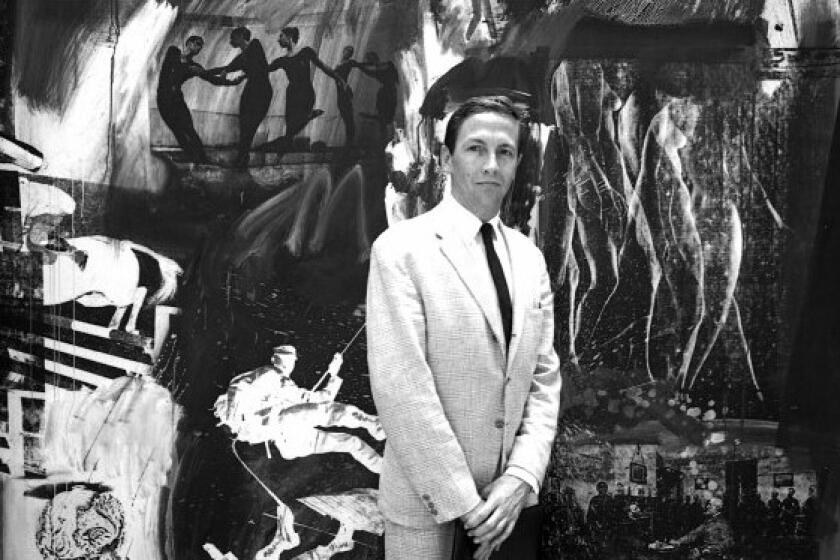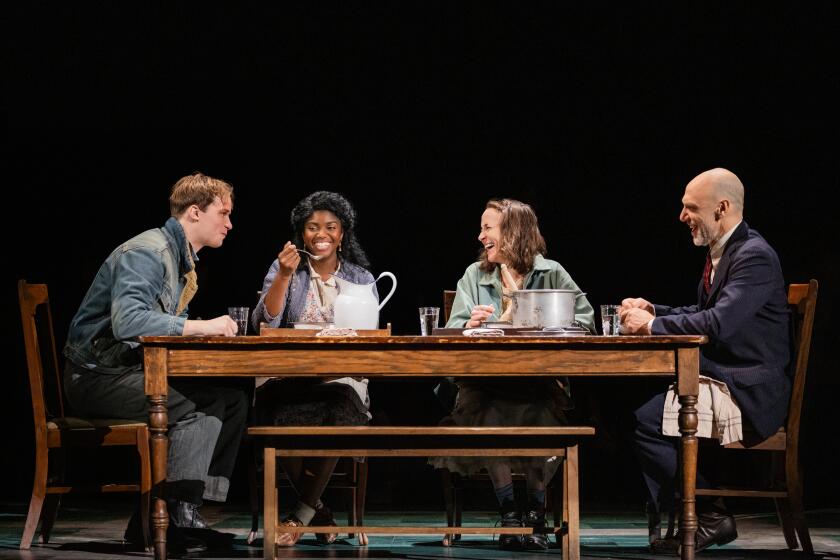OPERA REVIEW : It Ain’t Necessarily Show : New ‘Porgy and Bess’ Production Veers From Hokum to Pathos
So what is “Porgy and Bess” anyway? Opera or musical?
George Gershwin called his ambitious masterpiece a “folk opera,” and the complex score certainly supports the label. The premiere production in 1935, however, was a truncated, prettified, watered-down Broadway effort, and many subsequent versions have stressed the inherent jazzy diversions at the expense of tragic pathos.
The “Porgy” that opened Wednesday night under the auspices of the Music Center Opera at the Dorothy Chandler Pavilion, comes with imposing operatic credentials.
It originated at the Houston Grand Opera, which had hosted an epochal staging by Jack O’Brien 19 years ago. The latest production is funded by a consortium of nine opera companies and the Orange County Performing Arts Center.
The score, energetically conducted by John DeMain, is presented virtually uncut. It runs nearly 3 1/2 hours, with a single intermission. That may be a bit much of an uneven thing. Still, one has to be grateful that Gershwin’s original intentions are being taken seriously.
When this “Porgy” was seen in San Diego last March, it looked pretty good and sounded pretty bad. Although the stage direction and choreography, entrusted to Hope Clarke, veered uncomfortably at times toward slick entertainment cliches, the opening-night cast was strong, the ensemble was tight, and the pace was propulsive.
Ken Foy’s traditional sets, sensitively lighted by Ken Billington, proved both atmospheric and flexible. Judy Dearing’s traditional costumes steadfastly avoided pseudo-Gullah glitz.
The good intentions were all but nullified, however, by the use of microphones. Amplified opera had reared its hideous head.
Much has changed since March.
Clarke’s name still appears in the program, but the voluminous credits boast “additional staging by Tazewell Thompson” and “additional choreography by Julie Arenal.” Cutesy-fussy business often clutters the stage. So does hokey show business.
The impoverished residents of waterfront Charleston just can’t sit down. They may not behave like the Catfish Row corps de ballet, but they certainly perform like hard-working members of the Catfish Row chorus line.
Still, there is good news. The pervasive high spirits are compelling. And when the viewer is allowed to concentrate on the principals, the reduced focus comes as a welcome dramatic shock.
Even more rewarding, Peter Hemmings, the brave general director of the Music Center Opera, has decided to turn off the infernally blaring loudspeakers. The singers sound like live humans at last. Sexy Bess no longer wears a microphone in her hair. It is a great relief.
Hemmings does insist, however, on imposing supertitles on a American opera that needs no communicative boost. Although the general level of diction is clear, the words of the songs are flashed on a screen atop the proscenium, as if no one knew or could follow the text of “Summertime” and “I got plenty o’ nuttin’.” Even the spoken lines are “translated.” In this instance, the titles are redundant, distracting and insulting to both cast and audience. The dialect, not incidentally, sings better than it reads.
The poignant opening-night hero was Alvy Powell as Porgy--burly, intelligent, warm-voiced and, like Willard White and William Warfield before him, more bass than baritone. Borrowing from Trevor Nunn, the director lets his protagonist walk with a crutch, which obviously adds to his stature but makes one question his fateful refusal to join the outing on Kittiwah Island.
The spirit of revisionism (or is it touring economy?) also deprives the titular beggar of a four-legged companion to pull his cart. Got no mule? This Porgy doesn’t even have a goat.
Marquita Lister brings lustrous tone, vibrato notwithstanding, to the arching phrases of Bess. Moreover, she projects a compelling degree of earthiness that, thank goodness, rejects any flirtation with phony glamour.
Larry Marshall, a veteran of many “Porgy” tug o’ wars, reverts (successfully) to his old song-and-dance routines as the ever-sleazy Sportin’ Life. Stacey Robinson, the new Crown, exudes little menace and less vocal force, but bares his pecs honorably.
Kimberly Jones as Clara floats the pianissimo phrases of “Summertime” with exquisite sweetness. Luvenia Garner as Serena makes much of the plaintive glissandos in “My man’s gone now.” Ann Duquesnay plays and snarls to the gallery as a Maria who cannot quite justify the restoration of “Struttin’ Style.”
The minor roles are deftly delineated, and the 34-voice chorus makes a mighty, resonant noise. The orchestra, locally recruited, follows DeMain’s brisk beat with more fervor than finesse.
Incidental intelligence: In his obligatory program message, Hemmings claims that “in this country [“Porgy”] can only really attract a suitable cast if many opera companies join together to contract and cast it.” That gives one pause.
* “Porgy and Bess,” sponsored by the Los Angeles Music Center Opera at the Dorothy Chandler Pavilion, 135 N. Grand Ave., continues through June 18, with alternating principals. Evenings at 8, weekend matinees at 2. $15-$60. (213) 972-7211. Additional engagement sponsored by the Orange County Performing Arts Center, Segerstrom Hall, 600 Town Center Drive, Costa Mesa, June 21-25. Evenings at 8, weekend matinees at 2. $19-$60. (714) 556-2787.
More to Read
The biggest entertainment stories
Get our big stories about Hollywood, film, television, music, arts, culture and more right in your inbox as soon as they publish.
You may occasionally receive promotional content from the Los Angeles Times.






